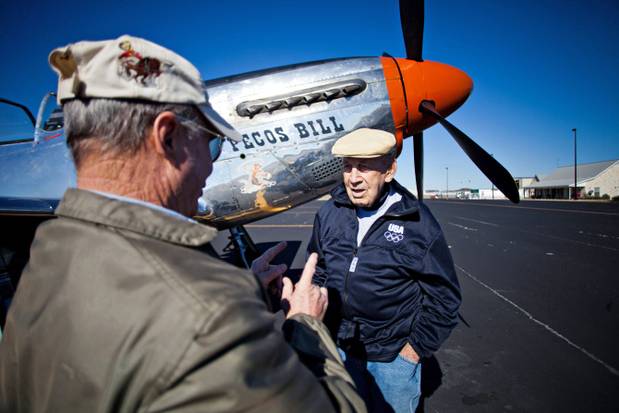
The Doolittle Tokyo raiders flew their planes after the bombing of Pearl Harbor even when they knew they barely had enough fuel to return home. The men are close to receiving recognition for their sacrifice during the World War II through the efforts of a Texas lawmaker.
April of 2013, Rep. Pete Olson made a bill to ensure that the raiders get the top congressional recognition, the Congressional Gold Medal. The senate also passed their own version of the bill garnering more than 290 co-sponsors in the House.
“I can’t see why it won’t become law,” Olson said claiming that the raiders will finally get the credit they deserve.
The 80 men volunteered on a highly dangerous mission to attack Japan, April of 1942. The successful raid of the American forces was said to avenge the attack of Japan’s forces on Pearl Harbor about four months earlier.
General Jimmy Doolittle, a famous aviator, led the mission. The mission was to use the 16 B-25 bombers from the USS Hornet, a carrier. Many of the airmen who volunteered had never had experience flying from a carrier nor a B-25 from a deck of ship making the plan even more risky.
“They said they wanted volunteers for a dangerous mission, and I said yeah,” said Richard E. Cole of Comfort, Texas. “That was our job. There’s no way out of it.”
The airmen dropped bombs on their Japanese military targets. The raid was declared a success. While doing little damage, the raid signaled the Japanese that the US has just joined the battle seeking to defeat their enemies.
Cole, now 98 and one of the four surviving members of the raiders, served as a co-pilot of the lead plane in the raid. The plane was flown by Gen. Doolittle himself.
The airmen also encountered complications to their initial plan. Japanese reconnaissance ships have already seen the Hornet on its way to their target. The raiders had to maintain a farther distance than planned to avoid further detection and unwanted clash. This meant that they are in danger of running low on fuel not enough to reach the friendly Chinese territories after their bombing runs. However, they still went ahead with their mission.
“We all knew that, and just trusted the fact that our mechanics and our engines would get us through,” Cole said.
After their bombing, some of the airmen were unlucky in making their way back to safe territories. Many of their crew members made their emergency landings in Japanese occupied areas in China.
Cole said he bailed out on an area in China occupied by Japanese forces. His parachute got tangled on a tree on his way down. It was night time so he could barely see his surroundings and decided to spend the night there. At daytime, he carefully crept down the tree and made a journey across the country careful not to be detected by Japanese forces.
On his way, he came along some friendly Chinese troops who helped him find his way back to where the U.S. forces were. He journeyed for four days oftentimes on foot. He also explained that many of his fellow airmen shared the same experience of getting to safety.
The mission made a strong bond among the airmen.
“He came back to the men of the Doolittle raid,” said Cindy Chal, Cole’s daughter, of Doolittle. “There was some kind of bond there. Doolittle said, ‘If we survive this, I’m going to throw you all a huge party.’”
The party then became an annual occasion and gathering of raiders.
“It’s a really special story, and it’s special because they were ordinary people,” Chal said.
She went on to describe the war exploit of the airmen during the Doolittle raid as “an American fairytale” of brave men who were united on a goal to see through their mission despite the great risks involve.
Olson explained that the Doolittle raiders have still to receive the sufficient recognition they deserve. After hearing of the story of the Doolittle raiders during their 70th anniversary, the lawmaker became motivated to draft to award the airmen with the prestigious Congressional Gold Medal.
The award was first given to George Washington in 1776 by the second Continental Congress. It is said to be the highest civilian honor given by the federal government.
Olson said that Gen. Doolittle reportedly died in 1993 while the rest of his crew are getting older with the youngest being 92. He claimed that it would be way much better to award the medals when the raiders are still alive.
The four surviving raiders commemorated their annual convention in Dayton, Ohio, April of last year. The place is known to be the home of the National Museum of the U.S. Air Force. If the medals would be awarded by the Congress, they would be displayed in the said museum.
Due to issues on health due to old age, the airmen who gathered agreed that the convention of last April would be their last.
“Before the last one leaves, we have to get them this honor,” Olson said. He further said that the passage of the bill would be a top priority for the lawmakers.
